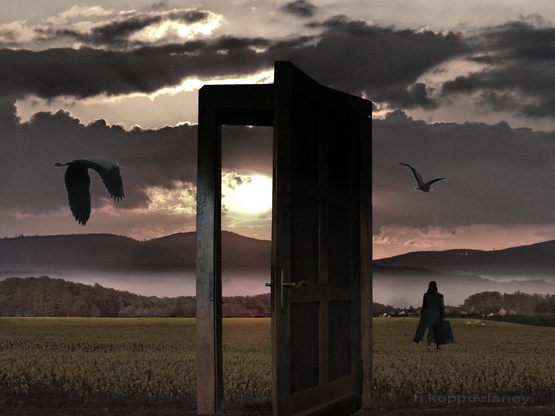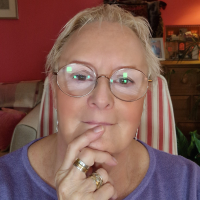So let’s go there! That closet, the one we won’t open, daren’t open, can’t open, mustn’t open.
Shame, embarrassment, guilt, disgust, self-loathing—they find us all, don’t they? And we dread them! Oh, how we fear them!
They lurk in the shadows, waiting to pounce. Down dark alley ways or in rooms covered in dust and cobwebs or behind locked doors we don’t open anymore.
They are our demons, our denied acts and conveniently forgotten given-into temptations, our traumas, our envies and jealousies our rivalries and spite, our dishonesties, our mistakes, our imperfections—you name them, they’re all there.
They are the bits of us no-one must ever see.
So how come these things, these places, these parts of us must never see the light of day? How is it that they must be hidden from all eyes—even our own—and that we must spend a lifetime stuffing then into drawers and cupboards, attics and cellars, moving house again and again so we can leave them back there where the bad memories reside and just start again?
Well, that’s easy. We all know the secret answer; it’s just that nobody speaks about. You know why, just like I know why.
Want me to say it out loud? Want me to say it for you? Just the way it is?
Okay, here it is:
If anyone else were ever to see these things or know about them, they wouldn’t like us or love us anymore. And if we ourselves were ever to see these things or know about them, we wouldn’t be able to keep up the pretence that we were perfect anymore so we couldn’t even love ourselves anymore.
Woah! That’s pretty big, isn’t it? The fear and dread we carry around because of it? And you know what’s even crazier?
We’re all carrying the same secret but we’re all convinced that no-one else knows about it.
It doesn’t take us long, to figure out that the best way to be accepted is to do our best to hide the unacceptable parts of ourselves and to only show the parts we reckon are acceptable to the world.
We learn this early on in a series of don’t-be statements: “don’t be angry,” “don’t be selfish,” “don’t be mean,” “don’t be greedy.” We learn that to do any of these things makes us unacceptable. A bad person. When Carl Jung coined this beautifully imaginative and evocative phrase, many years ago, this is what he meant: everything that we perceive to be unacceptable and shameful belongs in our “shadow”—our secret, hidden place.
In reality, of course, we all have a shadow side, and, as a therapist, I spend my working life helping clients to accept and integrate what they feel is unacceptable about themselves back into their picture of themselves so they can feel whole. Only when we can accept all of who we are can we be healthy and free.
Here’s what happens when we push everything into our “shadow self,” into the closet, the attic, that locked room:
We shut down emotionally; we no longer know what we feel. To dare. to feel is to risk feeling bad things. We couldn’t survive feeling bad things.
Because we’re out of touch with what we feel, we walk around like a coiled spring of emotion and we feel out of control.
We lack awareness and so we’re liable to explode or collapse without warning when something triggers us into acting out the feelings we’re suppressing.
It also means that we can never feel good about ourselves because we spend so much time focusing on, and trying to hide, what we believe to be our bad bits.
Another consequence of pushing away all the ‘bad emotion’ is that we end up feeling flat and empty and hollow because we’ve inevitably pushed away all the ‘good emotion’ too.
Because we’re judging ourselves so vigorously and harshly, we end up judging everyone else in the same way and so we despise and hate in others what are actually aspects of our own shadow side. It is this we are referring to when we talk about being mirrors or reflections of each other.
We deny parts of ourselves only to perceive them and despise or attack them in others. This affects and colors our view of the whole world, since we project out into the world the disavowed parts of ourselves that we’re hiding from ourselves.
Therefore, not only do we see those parts in others; we decide that the whole world is this way. It becomes hard to see goodness anywhere. So the world becomes a bad place full of bad people all doing bad things while pretending to be good.
We blame everyone and everything else instead of taking personal responsibility, because taking personal responsibility involves accepting and admitting we’re less than perfect, which is unthinkable. We’ve put all that in the closet, remember? We’re always right and everyone else is always wrong because the cause of our unhappiness and discontent is ‘out there’ and not ‘in here.’
We also fall into the trap of ‘if only.’ If only this, or if only that, everything would be perfect and we’d be happy. We constantly look to escape what we perceive to be an imperfect existence. We can’t enjoy now because now is a reminder of how imperfect we are.
The reason for doing “shadow work” is to undo all this, to minimise the split between what we allow of ourselves and what we deny or push away. It helps us integrate what’s hidden from view and to become whole, to stop hiding from ourselves and accept all of who we are, with compassion and without judgment. To accept fully our humanity. To end our suffering from guilt and shame. And in doing so, accept our divinity.
As a therapist in training, exploring and integrating our shadow side was an absolutely central and essential aspect of the personal work we all had to do—there was nowhere to hide anymore. This is why therapists are so comfortable talking about difficult things and owning difficult bits of themselves so they can help others to do the same. The training and the personal and group therapy is rigorous and takes you apart in order to really get to know yourself—the freedom it brings is extraordinary.
Shadow work aims to do something similar. Once we stop hiding from ourselves, we can stop hiding from the rest of the world and let go of the illusion that perfection even exists. Instead, we can stand in the beauty of our perfect human imperfection. We came here to embrace and taste it all.
That is the adventure! Isn’t it glorious?
Those drawers and closets, attics and cellars aren’t holding what we think they hold at all! When we dare to open them, we find they all look the same—my closet looks exactly like your closet. And what you have in your attic is exactly what we’ve all got in out attics. Because what we’ve all hidden away, for fear that no-one else must see, is our common humanity.
Now we can see how big this is. Breaking the secret is the most empowering and life-changing step we can ever take, for when the shadow is transformed by being owned and recognized for what it truly is, it becomes love and compassion beyond measure.
That’s the path to healing and the shadow’s true purpose. That purpose is always to challenge us back to unconditional love. Every aspect of ourselves is a gift. Our shadow side is there to remind us that we are incomplete until we have remembered unconditional love, forgiveness, kindness, tolerance, compassion. Not just for others but for ourselves. Most of all, for ourselves, for that is the most difficult challenge of all. We can’t feel such emotions fully towards others until we can feel them towards ourselves.
Judgement of self will always breed judgement of others. Love and compassion towards self will always breed love and compassion for others.
Our dark side is only dark if we keep it hidden. When we bring it out into the open, we discover what an amazing and powerful gift we have unwrapped. And, joyfully, that there never was anything to fear. That it unites us, rather than divides and separates as we feared. And that deeply sacred experience always transforms us and, consequently, everyone with whom we come into contact.
Do you catch the wonder of that? We have to discover, own, accept and embrace everything we are, because that’s why we came. It’s our destiny to be whole; we’re more than deserving. We are worthy of love, and of our own self-love. We’ve never been unlovable, ever. We are deserving of forgiveness and compassion, of understanding and unconditional acceptance. Most of all, from ourselves.
We came for the adventure of tasting humanity in all its rawness and fullness, yes; but we also came to remember our divinity and to stand in our full power and purpose.
I wish for us all to dare to reach for the freedom that is our birthright and soul’s calling, and to be gloriously, joyfully free.
~
Author: Janny Juddly
Editor: Katarina Tavčar
Photo: Hartwig HKD/Flickr











Read 1 comment and reply